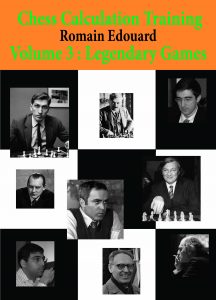Chess Calculation Training : Volume 3 : Legendary Games by Romain Édouard

This is the third book in the current series following on from previous volumes covering Middlegames and Endgames.
Romain Édouard (born 28 November 1990) is a French grandmaster and is Editor-in-Chief of Thinkers Publishing. Édouard has played for the French national team at the Olympiads of 2010, 2012, 2014 and 2018, won several major tournaments including equal first place in the 2015 World Open and Montreal Open 2015.

The material is arranged into fifteen chapters and each chapter covers a particular theme e.g. “Deliver Mate” and “Hidden Moves” . Four chapters employ examples from the games of famous players (Fischer, Karpov, Kasparov and Kramnik) covering one particular aspect of their play which made them stand out from their contemporaries e.g. Kasparov’s checkmating attacks or Karpov’s outstanding precision in technical positions.
Volume 3 has fifteen chapters and 480 exercises. In this book, we encounter many subjects, for example attack, defence, “surprises” and hidden moves, while some chapters will be especially dedicated to four great players – Kasparov, Karpov, Fischer and Kramnik – in order to learn about their styles. The last two chapters are a little different, ‘Extraordinary Wins’, where you will see moves of the kind you won’t meet very often in life, and a ‘Special Section’, with exercises requiring special instructions.
The material is presented in a workbook format which is generally popular and no doubt influenced by the techniques of famous trainer Mark Dvoretsky. The author provides guidance at the beginning of each chapter on how difficult the material is and which positions in particular are extremely difficult where the student should devote additional time.
The range of material is varied, from simple to solve right up to extremely complex positions. The author recommends starting out by solving a small number of warm-up exercises from chapter one before tackling the more challenging material. This type of study, solving positions on specific themes can be a double edged sword, as on the one hand providing an opportunity to study a specific theme in depth and reinforce the theme by repetition but, on the other hand, you can become too narrowly focused : expecting a type of solution. If you have just solved 100 tactical exercises, involving pins you will probably spend a lot of effort in your own games looking for pins and not focusing on other tactical opportunities. The author avoids this trap as the material in each section is broad enough within the overall theme and you may not always know exactly what the winning motif is only that there is one there.
It is also very easy to organise your own study around a workbook, as you can set aside a certain target, say to study a given number of positions and log your progress. In addition, if you are familiar with memorising techniques you can easily create a schedule to periodically repeat the material.
Overall, I found this and challenging and entertaining book to read. I have not read the previous two volumes but would expect that they have been produced to the same high standard as the volume under review.
If you are an aspiring player looking to improve your game you should find that the material is challenging enough to help you on your journey. If you are just a casual player who enjoys sitting down and solving some interesting and challenging problems then there is something there for you as well.
Tony Williams, September 10th 2018

Book Details :
- Paperback : 272 pages
- Publisher: Thinkers Publishing (8 Sept. 2018)
- Language: English
- ISBN-10: 9492510308
- ISBN-13: 978-9492510303
- Product Dimensions: 17 x 23.5 cm
Official web site of Thinkers Publishing

